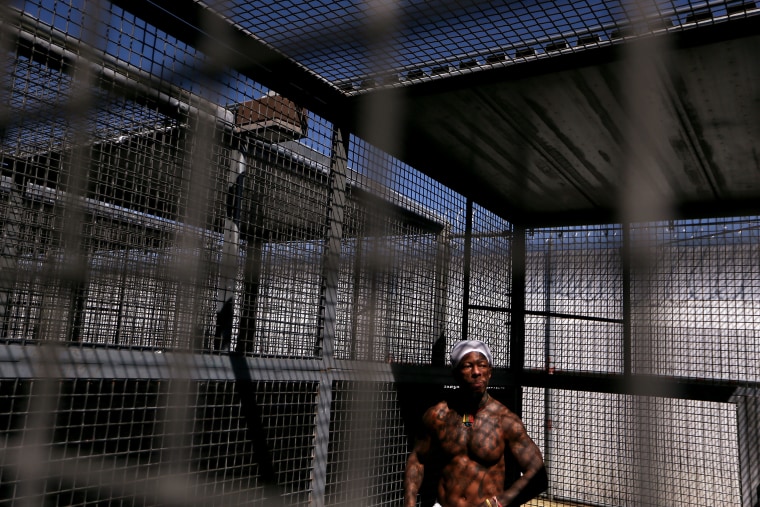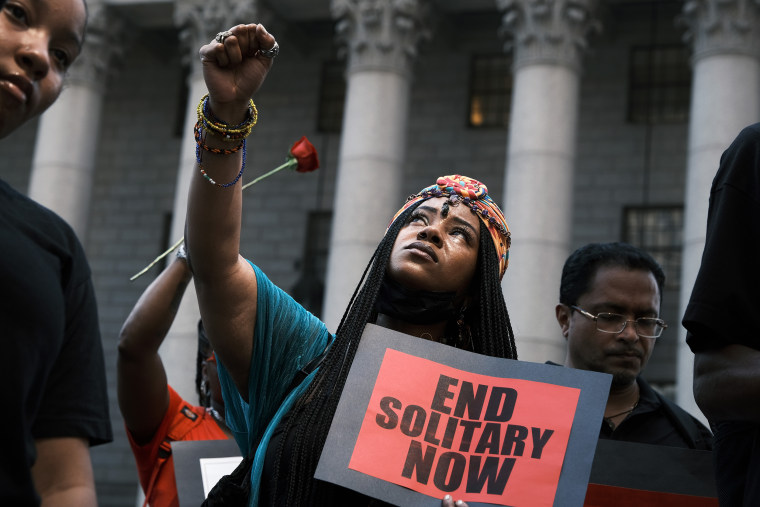Bill to Ban Solitary Confinement in Federal Prisons Introduced in House
By Erik Ortiz July 27, 2023, 11:01 AM EDT / Updated July 27, 2023, 12:06 PM EDT
The End Solitary Confinement Act would prohibit isolating inmates and detainees with limited exceptions while ensuring their due process rights.

A bill that would broadly ban the use of solitary confinement in federal prisons, jails and detention centers was introduced by a coalition of House Democrats on Thursday, a measure that seeks to codify into law the limitations on when and how long someone can be left isolated in a cell.
Under the End Solitary Confinement Act, inmates and detainees would not be segregated alone for more than a maximum of four hours in order to de-escalate an emergency situation, and even then, staff would be required to meet with them at least once an hour. Incarcerated people would also be ensured access to at least 14 hours of daily time out of their cells, including access to seven hours of programming meant to address topics such as mental health, substance abuse and violence prevention.
Roughly 122,000 people in federal and state adult prisons and federal and local jails are placed in restrictive housing — informally known as solitary confinement — for 22 hours or more on a given day, according to a nonprofit watchdog report based on government data.
“Someday, we will look back and ask why we ever subjected people to prolonged solitary confinement and expected anything other than trauma, violence and death as a response,” said Rep. Cori Bush, D-Mo., who is co-leading the legislation along with fellow Democratic Reps. Sydney Kamlager-Dove of California, Rashida Tlaib of Michigan, Bonnie Watson Coleman of New Jersey, and Adriano Espaillat and Jamaal Bowman, both of New York.
At a news conference announcing the legislation, lawmakers said they were concerned by studies of suicide and self-harm among inmates who have been placed in solitary confinement.
“People need to socialize in order to live and thrive and survive,” Kamlager-Dove said, “and correctional facilities know that which is why they find small technical violations in other ways to throw people they don’t like or want to punish or remind who’s boss into solitary confinement.”
In recent years, all but a handful of states have introduced or passed legislation aimed at curbing solitary confinement, including ending the practice for vulnerable populations, such as juveniles and pregnant or LGBTQ prisoners.
Senate Democrats introduced a bill last fall to reduce the use of solitary confinement by the Federal Bureau of Prisons. The House bill goes further, placing not only a cap on hours inmates can be isolated, but also mandating that the federal government regularly report the number of incidents of self-harm and suicide at federal facilities, as well as reporting the use of solitary and demographic breakdowns of those confined during emergency de-escalation situations.
Other oversight mechanisms would also be installed if the bill becomes law, including the creation of a community monitoring body that would be empowered to investigate complaints of abuse. Prisoners would also have expanded protection to ensure their due process rights.
“This legislation is unique and particularly powerful because it includes all federal carceral facilities, including immigration detention centers,” said CJ Sandley, a staff attorney at the Center for Constitutional Rights, which has challenged states’ use of prolonged solitary confinement. “It’s protecting the rights of people on the inside to advocate for themselves and speak the truth of what they’re living through while they’re living through it.”
The state of solitary confinement
- Biden pledged to end solitary confinement. Federal prisons are increasing its use.
- New York City may ban solitary confinement in jails as a bill outlawing the practice gets veto-proof majority
- Louisiana limits solitary confinement for youths
- Why is solitary confinement increasing in federal prisons? New BOP chief wants to know
Whether the bill will garner bipartisan support or an endorsement from President Joe Biden remains to be seen. The White House did not immediately respond to a request for comment Thursday.
Before taking office, Biden pledged to overhaul the federal prison system, in part “by ending the practice of solitary confinement, with very limited exceptions.”
More than 150 legal, faith-based and criminal justice advocacy organizations are endorsing the bill, including the American Civil Liberties Union and the NAACP. Advocates are hopeful it will motivate the Biden administration to take up the issue.
“We have a president who ran on a criminal justice platform, and he made a lot of promises to Black and brown people specifically as we supported his campaign,” said Johnny Perez, director of the U.S. prisons program at the nonprofit group National Religious Campaign Against Torture.
“It’s hugely disappointing that this is one campaign promise that he has not lifted a finger on and addressed,” added Perez, a former inmate at New York’s Rikers Island jail complex, where he had been placed in solitary confinement as a teenager.

Since May 2022, when Biden issued an executive order to overhaul the criminal justice system and ensure federal inmates are free from “prolonged segregation,” the number of people held in restrictive housing has continued to climb — up 10% as of this week, Bureau of Prisons data show.
Experts say it’s difficult to pin down the exact number of inmates held in solitary confinement as federal, state and local jurisdictions don’t all agree on how they define the practice. There’s also little accountability for facilities that fail to report instances and inmates may choose not to file complaints to avoid further retaliation, they say.
The House bill also incentivizes states and municipalities to end solitary in state- and local-run carceral facilities.
After interviewing scores of prisoners held in solitary confinement in the United States, academic researchers Earl Smith and Angela Hattery said they found numerous occurrences of prison staff isolating inmates for minor infractions, and punishing them with no communication and no phone calls and by withholding even medication and books.
Unions representing corrections officers have argued that isolating inmates can be necessary to prevent harm to staff and other prisoners.
“It’s a system that is so out of control that it’s unbelievable,” said Smith, who is with Wake Forest University. Smith and Hattery co-wrote the 2022 book, “Way Down in the Hole: Race, Intimacy, and the Reproduction of Racial Ideologies in Solitary Confinement.”
Hattery, who is with the University of Delaware, said any federal legislation must include independent oversight of the system and guarantee inmates who have been exposed to solitary confinement are treated for their trauma.
When incarcerated people return to their communities after release, “they have really high rates of family disruption, divorce, substance abuse,” she said. “There’s a lot of coping that needs to be done, and they’re bringing all of their trauma from solitary confinement with them home, as well.”
Erik Ortiz is a senior reporter for NBC News Digital focusing on racial injustice and social inequality.
This article was originally published on July 27th, by NBC News.